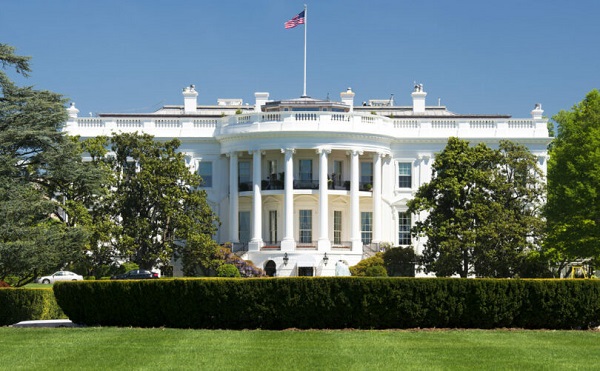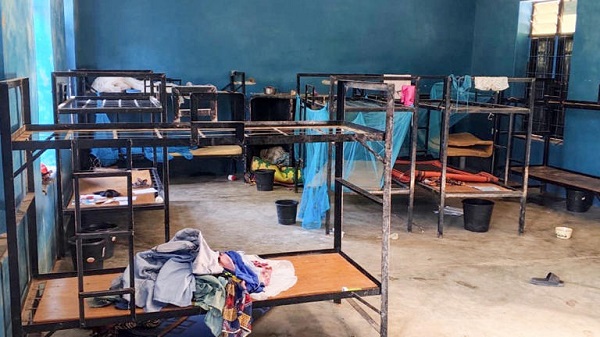International
Trump ‘shocks the deep state,’ sidesteps ‘weaponized’ White House transition process’

From LifeSiteNews
The president-elect is attempting to avoid the mistakes he made during his first term by this time privately funding the transition.
Two viral postings on X describe how President-elect Donald Trump is avoiding D.C.’s entrenched “permanent state” that sought to upend his first presidency before it started, beginning with his January 2017 transition into the Oval Office.
“Having experienced firsthand the malevolence of the so-called ‘permanent government’ during his initial transition in 2016-2017, Trump is under no illusions about the loyalty or intentions of the civil service – particularly the General Services Administration (GSA), Federal Bureau of Investigation (FBI), and the Department of Justice (DOJ),” amuse explained on X. “The current transition struggle exemplifies the danger of allowing the permanent bureaucratic state to accrue power unchecked.”
“During his first term, Trump’s transition team – Trump for America, Inc. (TFA) – faced betrayal when the GSA improperly handed over thousands of emails from the transition period to Special Counsel Robert Mueller without proper authorization,” amuse wrote. “An agency ostensibly dedicated to facilitating the transition had instead been co-opted to undermine it.”
Amuse continued:
The FBI, which once served as an institution above the fray of partisan politics, has shown its hand in its dealings with Trump – spying on his 2016 campaign, embedding female honeypots within his transition, and using “national security” briefings as a pretext to disqualify his appointees, like General Michael Flynn. The Justice Department Inspector General found that former FBI agent Peter Strzok even sent another FBI agent to an intelligence briefing with Trump and Flynn as part of an effort to build a Russia collusion case against them.
These actions are not the behavior of a neutral party facilitating a democratic handover; they are the machinations of a bureaucracy desperate to retain control.
As a result, the president-elect has chosen to privately fund his side of the transition from the Biden administration.
Trump’s transition strategy: ‘Annihilating the deep state’s control’
“Trump’s MAGA administration just dropped a nuclear bomb on Washington’s corrupt establishment. By rejecting taxpayer-funded GSA tools and launching a fully private transition, Trump is cutting the deep state out of the equation. This isn’t just a handoff – it’s a full-scale revolution,” Ann Vandersteel wrote on X and Substack.
“In a jaw-dropping move, Trump has signed the Transition Agreement with the outgoing Biden administration — but with one massive twist. There’s no GSA involvement. No government phones. No government buildings. Nothing,” Vandersteel wrote.
“This isn’t about tradition. It’s about annihilating the deep state’s control,” Vandersteel continued. “Washington’s gatekeepers are panicking. Trump’s strategy leaves them powerless, blind, and scrambling in the dark.”
She continued:
The deep state relies on access. They spy. They sabotage. They control. But Trump has cut off their lifeline. His team has gone dark – no leaks, no traps, no surveillance. For the corrupt elite, this is their worst nightmare. They’re awake, sweating bullets, terrified of what’s next.
Trump’s move isn’t just bold; it’s revolutionary.
- No GSA oversight. The tools used against him in 2016? Gone.
- No taxpayer dependence. This revolution is fully independent.
- No interference. The deep state can’t touch what they can’t see.
This is a calculated takedown of a corrupt system. Trump isn’t playing defense —he’s on the offensive.
“Washington’s establishment is in freefall. The deep state relied on GSA tools to spy, infiltrate, and sabotage. Now they’re locked out entirely. They’ve lost their grip, their leverage, and their power,” Vandersteel wrote. “This isn’t a transition; it’s a declaration of war against the corrupt establishment.”
“Trump’s transition is a bold strike against the forces that tried to destroy his presidency. No leaks. No oversight. No compromise. The deep state is crumbling, and Washington will never be the same,” Vandersteel said.
“The storm isn’t coming – it’s already here.”
Corporate media in the nation’s capital is not happy about Trump’s end run around those who are accustomed to playing an integral role in White House transitions.
The Washington Post, Biden regime are losing sleep over the transition
The Washington Post has decided Trump succeeding Biden in January represents a “hostile takeover of the federal government.”
The Post laments:
Since his victory, Trump has ignored many of the rules and practices intended to guide a seamless transfer of power and handover of the oversight of 2.2 million federal employees. Instead, the president-elect, who has pledged to fire thousands of civil servants and slash billions of dollars in spending, has so far almost fully cut out the government agencies his predecessors have relied on to take charge of the federal government.
“His transition teams have yet to set foot inside a single federal office,” Post writers noted two weeks after Trump resoundingly won the 2024 election, as if breaking with standard procedure were a criminal offense against the Washington establishment.
“In calls with foreign heads of state, Trump has cut out the State Department, its secure lines and its official interpreters,” the Post added.
The Post acknowledged that Trump also “bears deep animus against the FBI, according to the people familiar with his transition process. FBI agents searched Mar-a-Lago for classified materials in a case that resulted in federal charges, and he has pledged wholesale changes at the agency and at the Justice Department.”
The FBI would normally have begun vetting a president-elect’s transition team before Election Day, as well as his choices for Cabinet positions and other top staff jobs. Thus far, Trump has left the job of vetting candidates to Stanley Woodward, a D.C. lawyer on his campaign who has represented several January 6 rioters and Trump associates caught up in the classified documents case.
“I happen to know the Biden regime has been losing sleep over the transition,” amuse added in a subsequent X post. “Nothing is going to plan.”
International
Boris Johnson Urges Ukraine to Continue War

By Martin Armstrong
Trump’s proposal for peace in Ukraine has been met with an overwhelming condemnation from the world’s neocons. Former UK Prime Minister Boris Johnson reemerges from the shadows whenever he hears word that a war may be winding down. He played an instrumental role in persuading Zelensky not to negotiate a peace treaty with Russia when it was apparent that Ukraine could not easily win, and now, Johnson is urging Ukraine to continue the war.
“Imagine that you are Vladimir V. Putin and you are spending a calm Saturday in the Kremlin… You casually watch the television news, and you cannot help but smile at the incompetence of your opponents, at the astonishing weakness of the West. You have lost more than a million soldiers, killed and wounded, in your attempts to subdue Ukraine. You have still failed to capture more than 20 percent of the country’s territory. Your economy is faltering. And now they are talking about some new 28-point plan to end the war – and it could have been written entirely by the Kremlin,” Johnson warned.
In typical neocon fashion, Johnson wants to paint the proposal as a victory for Russia. He acknowledges millions have died, but since they are Russian, their lives do not matter. Continue the slaughter at the expense of the people.
Johnson declared that Britain was in a proxy war with Russia back in November 2024. “It has been pathetic… Let’s face it: We’re waging a proxy war but not giving our proxies the ability to do the job. For years now, we’ve been allowing them to fight with one hand tied behind their backs, and it has been cruel,” he admitted one year ago. Why would Britain feel threatened by Russia? Why would any sane leader thrust their people into a battle that is not theirs to fight?
The head of M16, Sir Richard Moore, also came out in November 2024, admitting British intelligence was discreetly fighting on behalf of Ukraine. “We cherish our heritage of covert action, which we keep alive today in helping Ukraine resist the Russian invasion,” Moore commented.
Moore and Johnson know that Russia has no incentive to invade Europe, especially Britian. There is absolutely nothing for Putin to gain. Europe, on the other hand, has everything to gain through conflict with Russia. They see Ukraine as the ultimate entryway into Russia
War is a great way to default on debts. You get to form a new government, and they always disavow the debts of the previous government. Europe has been committing economic suicide. Between the COVID-19 Lockdowns, the NET-ZERO Climate Change, and then the sanctions on Russia that doubled their fuel costs, you could not ask for a more brain-dead group of politicians who have ZERO comprehension of even how the economy functions.
Plain and simple—Russia invaded due to the West’s failure to honor the Minsk Agreement. The neocons disregard the proposal entirely and conveniently disregard the original signed agreement when discussing conceding territory.
“The document offers Ukrainians not only to give up any attempts to reclaim Crimea or Donbas, but also to cede vast territories, including about 250,000 Ukrainians whom the Russians do not even control. Of course, you knew your negotiators would try something like that. But you never believed anyone would take this seriously. You can’t believe that President Trump would back this plan, because it is a complete betrayal of Ukraine,” Johnson continued in his recent writing.
LET THE PEOPLE VOTE! The ethnically Russian people living in Ukraine have been unable to decide on their leadership. Zelensky outlawed their religion and language. Everyone believes they are protecting the people in these regions from the other side, but only one side is open to learning the people’s wishes. The 28-point plan saves the PEOPLE of both Russia and Ukraine. Russia cannot abandon the war without guarantees that NATO will back down and Ukraine is merely an EU puppet. Zelensky now has two days to decide whether he is willing to destroy his nation for the neocons.
Daily Caller
EXCLUSIVE: Here’s An Inside Look At The UN’s Disastrous Climate Conference


From the Daily Caller News Foundation
By Audrey Streb
The United Nations’ annual climate conference concluded Saturday, and some critics in attendance told the Daily Caller News Foundation that it was a chaotic affair.
After Thursday’s fire forced an evacuation and temporarily halted the talks, COP30 was prolonged by an extra day. Corporate media outlets and green groups critiqued the final agreement reached on Saturday, arguing that it did not do enough to restrict carbon emissions. The environmental groups claimed the resolution departed from COP28’s declaration which called for an end to fossil fuels.
Hosted in Belém, Brazil, COP30 provoked backlash after developers razed the Amazon rainforest ahead of the climate talks and China worked to seize the spotlight in America’s absence. Craig Rucker, co-founder and president of the conservative nonprofit known as the Committee for a Constructive Tomorrow,(CFACT) told the DCNF that this year’s UN climate talks were especially chaotic and disorganized.
Dear Readers:
As a nonprofit, we are dependent on the generosity of our readers.
Please consider making a small donation of any amount here.
Thank you!
“I’ve been to 27 of the 30 conferences. … What you see on the ground is just how chaotic it’s gotten. There was a certain chaos in the past, but this was particularly disorganized because they picked a venue that I think was unsuited for all the delegates that were coming in,” Rucker told the DCNF in an interview. “They wanted to emphasize the rainforest, yet hypocritically, they’re chopping them down to accommodate delegates flying in on private jets.”
The UN did not respond to the DCNF’S request for comment.
Rucker and Marc Morano, who publishes CFACT’s ClimateDepot.com, ventured into the Amazon rainforest to investigate the four-lane highway initially reported by BBC in March. Rucker told the DCNF that Brazil was “still cutting and burning. We heard the chainsaws ourselves, and this is something they [the Brazilian state] try to keep [quiet].”
The highway, known as Avenida Liberdade, was shelved multiple times in the past due to environmental concerns but revived as part of a broader push to modernize Belém ahead of COP30, according to the outlet. State officials say the development efforts will leave a lasting legacy, including an expanded airport, new hotels and an ungraded port to accommodate cruise ships.
The Brazilian state denied that the highway was built for the climate conference, noting that plans for the road were underway as early as 2020 — well before Brazil was selected to host COP30, Reuters reported in March.
President Donald Trump sharply criticized the conference for deforesting portions of the Amazon to ease travel for environmentalist attendees. The U.S. did not send an official delegation this year.
Democratic California Gov. Gavin Newsom and Democratic Rhode Island Sen. Sheldon Whitehouse attended the talks, where they denounced the Trump administration’s energy policies and absence.
A top United Nations official reportedly directed Brazilian authorities to address concerns including leaky light fixtures, sweltering heat and lackluster security at the conference, according to Bloomberg News. Days later, the fire broke out.
Morano also documented water pouring from vents, and Rucker told the DCNF that attendees were not allowed to flush toilet paper as the venue “didn’t have a septic system.”
Rucker also recalled what he described as elitism, noting that delegates were in the “blue zone” while other attendees and indigenous groups were relegated to the “green zone.”
“The blue zone is where the official delegates go, the people that are from Spain, Portugal, Brazil. … And these are the people that make the decisions,” Rucker said. “The indigenous people, they say, don’t have a voice allowed in there. That’s partially why they crashed it.”
Though COP30 did host several events featuring indigenous voices, some native groups stormed the COP30 venue the first week, demanding their voice be heard by the UN.
Rucker told the DCNF that China seemed to have become a “new leader” on the environmentalism and green energy front at the climate conference, though the oriental nation is “pumping out with two coal plants per week.”
Recent media reports have hailed China as a giant in building out “renewables,” though China is far from dependent on intermittent resources like solar and wind as it also churns out new coal plants and is the world’s top emitter.
“They genuinely looked at China as the world leader on climate change,” Rucker noted, branding it as “totally bizarre.”
Rucker recalled that upon the entrance of the “blue zone,” there was a “very impressive Chinese booth.”
Additionally, a statue demeaning Trump stood outside COP30, according to Reuters, as well as a horned jaguar-dragon hybrid statue with its hands gripping the globe. The fanged construction purportedly represented China and Brazil partnering to protect the rainforest.
“The statues are purely political statements: one symbolizes how communism is alive and well in Brazil and China, and the other is a misguided attempt to shame or critique Trump,” Director of the Arthur B. Robinson Center on Climate and Environmental Policy at The Heartland Institute Sterling Burnett told the DCNF. “Trump’s promotion of fossil-fuel development and broader use — especially encouraging developing countries to tap into affordable energy — will do more to help children in poor countries than all the climate agreements and green energy scams combined.”
-

 International1 day ago
International1 day ago“The Largest Funder of Al-Shabaab Is the Minnesota Taxpayer”
-

 Bruce Dowbiggin1 day ago
Bruce Dowbiggin1 day agoElbows Down For The Not-So-Magnificent Seven: Canada’s Wilting NHL Septet
-

 Censorship Industrial Complex1 day ago
Censorship Industrial Complex1 day agoUK Government “Resist” Program Monitors Citizens’ Online Posts
-

 Alberta1 day ago
Alberta1 day agoPremier Smith explains how private clinics will be introduced in Alberta
-

 International1 day ago
International1 day ago50 of the 315 students and 12 staff abducted from Catholic school in Nigeria last week have escaped
-

 Health1 day ago
Health1 day agoMore than 200 children will receive dangerous puberty blockers for new UK study
-

 Alberta1 day ago
Alberta1 day agoAlberta introducing dual practice health care model to increase options and shorten wait times while promising protection for publicly funded services
-

 Business1 day ago
Business1 day agoUS Supreme Court may end ‘emergency’ tariffs, but that won’t stop the President











